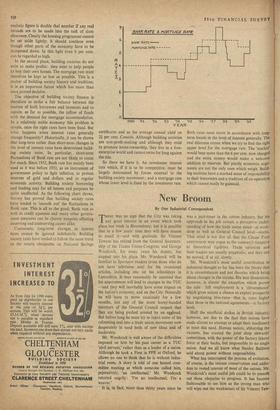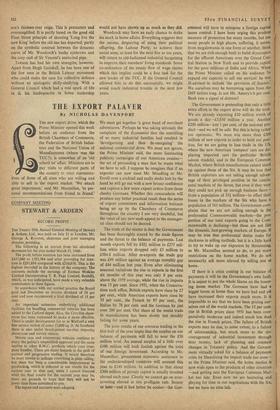New Broom
By Our Industrial Correspondent
THERE was no sign that the City' was taking any great interest in an event which took place last week in Bloomsbury; but it is possible that in a few years' time they will have reason to recall it—and with gratitude. Sir Vincent Tewson has retired from the General Secretary- ship of the Trades Union Congress; and George Woodcock, for many years his deputy, has stepped into his place. Mr. Woodcock will be familiar to Spectator readers (even those who do not have television sets) for his occasional articles, including one on his schooldays in Lancashire. It may reasonably be assumed that his appointment will lead to changes in the TUC —and they will inevitably have some impact on the nation's economy, and on the City. Naturally he will have to move cautiously for a few months, lest any of the more horny-handed members of the General Council suspect that they are being pushed around by an egghead. But before long he must try to inject some of his reforming zeal into a trade union movement now desperately in need both of new ideas and of leadership.
Mr. Woodcock is well aware of the difficulties imposed on him by his past career as a TUC 'civil servant,' rather than as a leader of a union. Although he took a First in PPE at Oxford, he allows no one to think that he is without indus- trial roots. A story is told of one heated com- mittee meeting at which someone called him, pejoratively, 'an intellectual.' Mr. Woodcock retorted angrily : 'I'm no intellectual; I'm a weaver.'
It is, in fact, more than thirty years since he was a part-tinier in the cotton industry, but his approach to his job reveals a perceptive under- standing of how the trade union mind— at work- shop as well as General Council level—works. That mind is not (for all that the Clause Four controversy may argue to_ the contrary) receptive to theoretical rigidities. Trade unionists and their leaders are usually pragmatic, and they can be moved, if at all, slowly.
Mr. Woodcock's most useful contribution to industrial thought so far has been the theory that it is circumstances and not theories which bring about changes in the unions. His best illustration, however, is almost the exception which proves the rule : full employment is a 'circumstance' which gives unions a chance to exploit prosperity by negotiating plus-rates—that is, rates higher than those in the national agreements—at factory level.
Half the unofficial strikes in British industry, however, are due to the fact that unions have made almost no attempt to adapt their machinery to meet this need. Human nature, abhorring the vacuum, has created the joint shop stewards' committees, with the power of the factory labour force at their backs, but responsible to no single union. And we all know what Stanley Baldwin said about power without responsibility.
What has interrupted the process of evolution, of course, is the intense conservatism and addic- tion to vested interest of most of the unions. Mr. Woodcock's most useful job could be to smooth out these obstacles to progress. It has become fashionable to see him as the strong man who will wipe out the weaknesses of Sir Vincent Tew- son's thirteen-year reign. This is premature and oversimplified. It is partly based on the good old Fleet Street principle of shouting 'Long live the new King' before the old one has departed; partly on the symbolic contrast between the dynamic curve of Mr. Woodcock's bushy eyebrows and the cosy curl of Sir Vincent's unexcited pipe.
Tewson has had his own strengths, however. Apart from Hugh Gaitskell, he has been one of the few men in the British Labour movement who could make the case for collective defence without an apologetic shilly-shallying. With a General Council which had a real spark of life in it, his inadequacies in home leadership would not have shown up as much as they did.
Woodcock may have an early chance to make his mark in home affairs. Everything suggests that the unions, despairing of using their political offspring, the Labour Party, to achieve their social aims, at least for the next five or ten years, will return to old-fashioned industrial bargaining to improve their members' living standards. Some co-ordination of the steady flow of wage claims which this implies could be a first task for the new leader of the TUC. If the General Council allowed him to do this successfully, we might avoid much industrial trouble in the next few years.























































 Previous page
Previous page